I’ve got a secret: a secondary project I’ve been working on for the past two years. It sat dormant on a bitbucket repository for most of that time. If that doesn’t make any sense to you, then congrats: you’re not a programming nerd. But even if you aren’t, you’re probably nerdy enough to have heard of a game called Dungeons & Dragons.
As for this secret project, it’s called Tabletop Nights, and it’s an interactive narrative game with dice rolls, choices, and the feel of sitting at the table playing D&D with a group of friends. It’s sometimes silly and often stupid, but always a fun time.
You can play it for free right here:
www.multiplechoicestudios.com/ttn
Dungeons & Dragons & Me
Many of my favorite childhood memories take place in basements during sleepovers with piles of character sheets and d20s. While my friends and I never lacked in video games to choose from, like Power Stone or Super Smash Bros, the D&D session was always the main event. It was what you were thinking about and planning for days in advance during study hall.
From Oriental Adventures, to Spycraft, to Star Wars, to countless homebrewed settings…I’ve been rolling for initiative for a long time. I knew what “ambidextrous” meant and how to spell it long before it showed up on a spelling quiz in middle school. It’s such a fun mix between a social and creative activity that I’m forever grateful I got into it when I did.
And I’m also happy for it to have gone mainstream. So many people have gotten into tabletop roleplaying in recent years and are having a blast. It’s not hard to see why!
What About Samurai of Hyuga?
SoH is my main focus, and will continue to be until the series is complete. As for TTN, it’s a side project that’s intended as a perk for patreon supporters, with a new session planned for release every month starting in March. With the programming mostly complete (aside from inevitable bug fixes) making content for it doesn’t take very long. The game is set up as a series of sessions, with each session being its own interactive short story.
You can find more details about releases and such over on my patreon!
Artificial Art
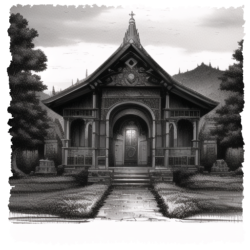 Unless you’ve been living under a rock for the past few months, you’re likely well aware of the advances AI has made—particularly in regards to art generation. Deep learning algorithms like Stable Diffusion are able to turn text prompts into images, with a level of accuracy that’s downright startling. As a full disclosure: all the art in Tabletop Nights is AI-generated.
Unless you’ve been living under a rock for the past few months, you’re likely well aware of the advances AI has made—particularly in regards to art generation. Deep learning algorithms like Stable Diffusion are able to turn text prompts into images, with a level of accuracy that’s downright startling. As a full disclosure: all the art in Tabletop Nights is AI-generated.
“Modern day magic spells” are a good way to think of these models: and trust me, there’s only going to be more of them. Advancements are being made (and disclosed to the public) rapidly, with music, storytelling, and even coding being generated with AIs like ChatGPT. In fact, ChatGPT helped me come up with javascript functions for Tabletop Nights—a thought that wasn’t even thinkable when I started working on it two years ago.
Living in an Artificial World
There are profound consequences to the release of these AIs, most of which we still don’t know about (and won’t for years to come). But one of the most immediate effects is on commission artists: those who make a living/some extra income off creating custom art for clients. To have dedicated years to a craft that suddenly has to compete with an advanced AI—one that can generate 100 variations of the same image in a matter of minutes…sucks.
It really sucks. Making money off making art is only going to get tougher as art generation becomes more mainstream and easier to do. While it’s hard to believe this coming from someone who writes stories about magical samurai for a living, I’m a practical guy. And believe when I say that every moral argument against the use of AI…just doesn’t matter.
As of the time of this writing, the legality is still up in the air, but if I had to predict the future: generated media will be settled on a case-by-case basis, with only generations that are very similar to popular, existing media ever seeing a trial.
It’s going to continue to be used by both organizations and individuals. The genie is out of the bottle, and you, as a creator—must adapt or die. The mediums we work in are changing more dramatically and at a quicker pace than any time in history. We still live in a scarcity world where it takes money to survive. And until that changes…creating assets isn’t enough anymore.
Thriving in an Artificial World
So what should the modern creative person do if they’re trying to etch out a living in their field? I think there’s probably a million answers to that, and you’ll ultimately have to find your own. But for a more general piece of advice, I think the answer lies in viewing AI as a friend to help your creative process—not an enemy that usurps it entirely.
If drawing buxom pirate babes is your thing, then by all means, continue to do so. But maybe you don’t like drawing detailed ship backgrounds, or maybe you need some creative corset ideas after your 100th babe. These are things AI can help with. It is a tool every modern creator needs to become familiar with.
As a writer, I’ll never be satisfied with the prose that an AI writes for me—because it didn’t come directly out of my head and so it wasn’t exactly what I wanted. But that doesn’t mean it can’t help me come up with scene ideas or help with outlining and making beat sheets.
Another good idea for anybody (creative or otherwise) is to focus on developing your Talent Stack: a series of skills that, when put together, allows you to create things that are uniquely your own. For myself, Tabletop Nights is a perfect example: it is a combination of writing, 2d art, and programming all steeped in knowledge of D&D and a lighthearted sense of humor. There’s a lot going on there!
While AIs can create amazing assets, putting those assets together in a unique way that utilizes the talents you possess…I think that’s the approach creators need to take going forward. We’re headed towards a future where our roles are more akin to that of a director: guiding and steering these magical systems to make our imagination into reality.
Foundation for a (Potential) Future
If you haven’t checked out Tabletop Nights yet, please do and give me some feedback—I’d really appreciate it! I know I’ve mentioned this on previous blog posts, but I don’t intend to write choicegames for the rest of my life (though I’m sure some would like that, lol!).
Ultimately, I want to have full control over my future work (and not just ownership). The only way I can do that is by hosting my stuff on its own platform. What you see with TTN is the start of that, and it’s why the programming side of it is so important to me.
So if the website crashes on startup or gives you any other errors, I’m eager to know. And of course, as always, thanks for reading!

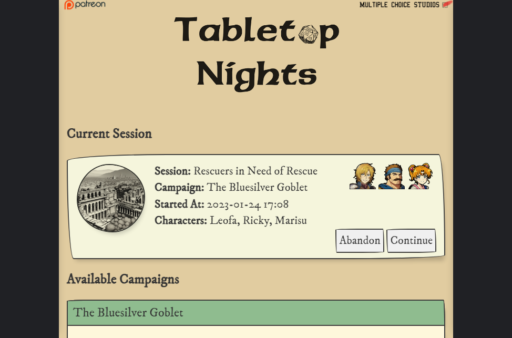
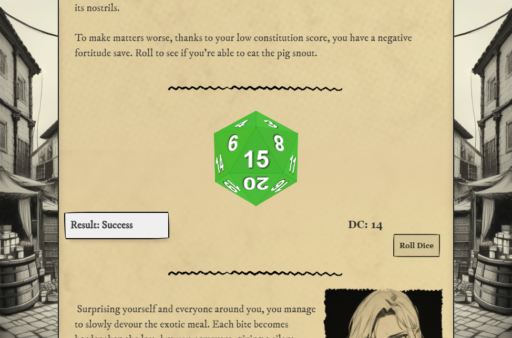
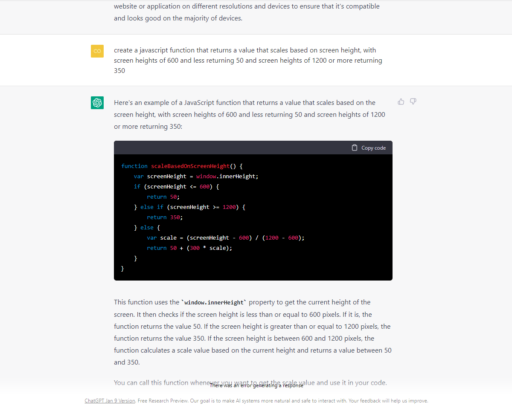
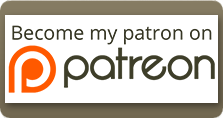
Recent Comments